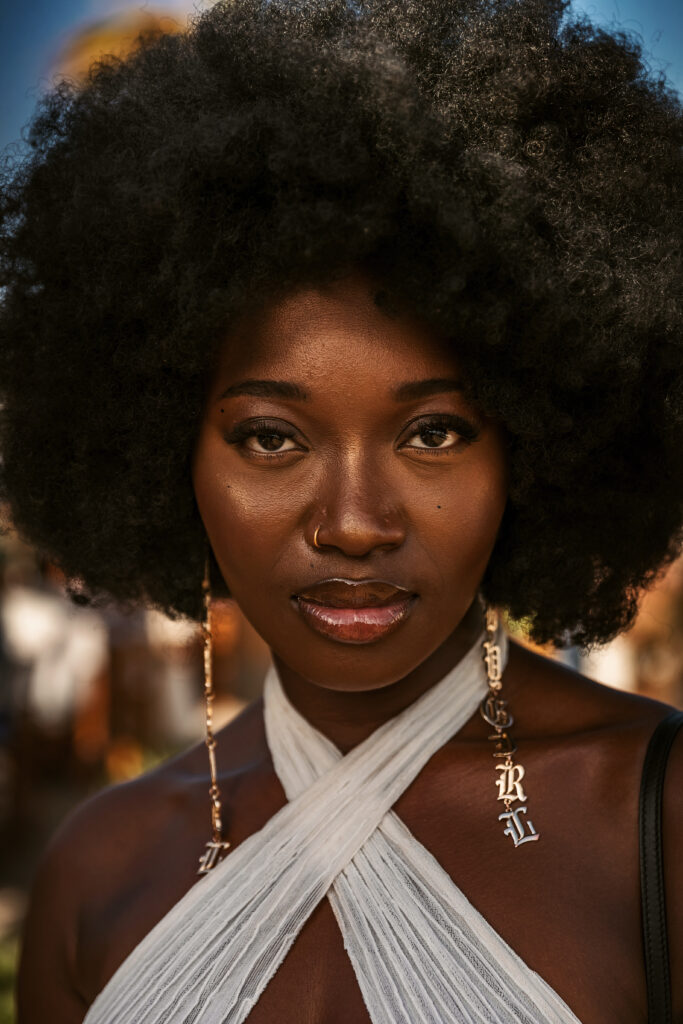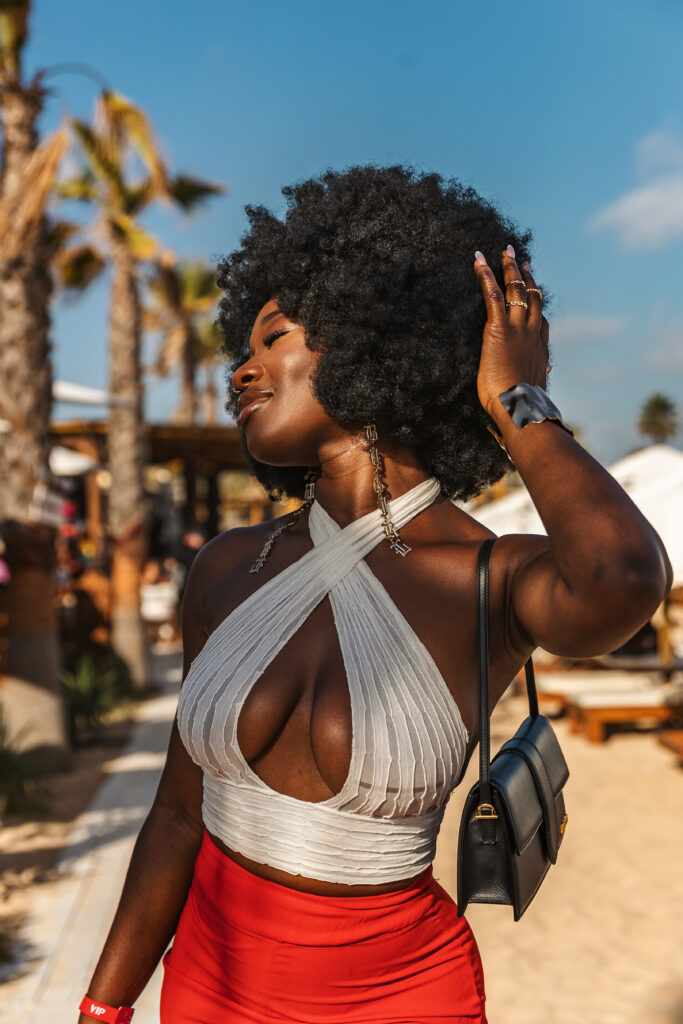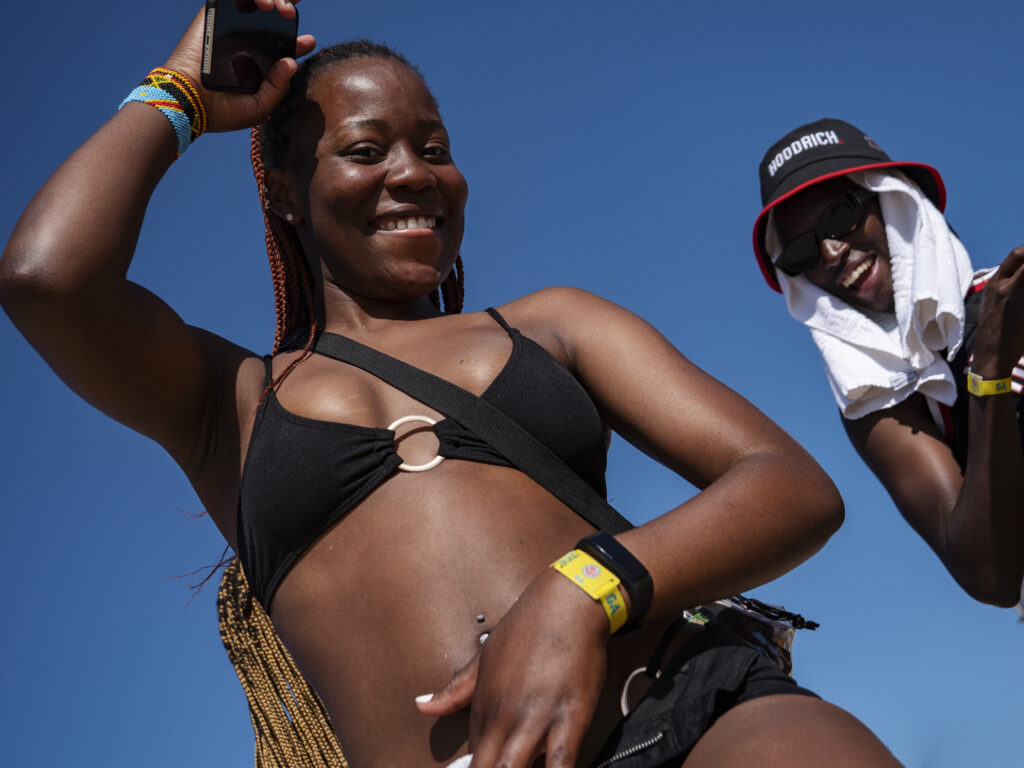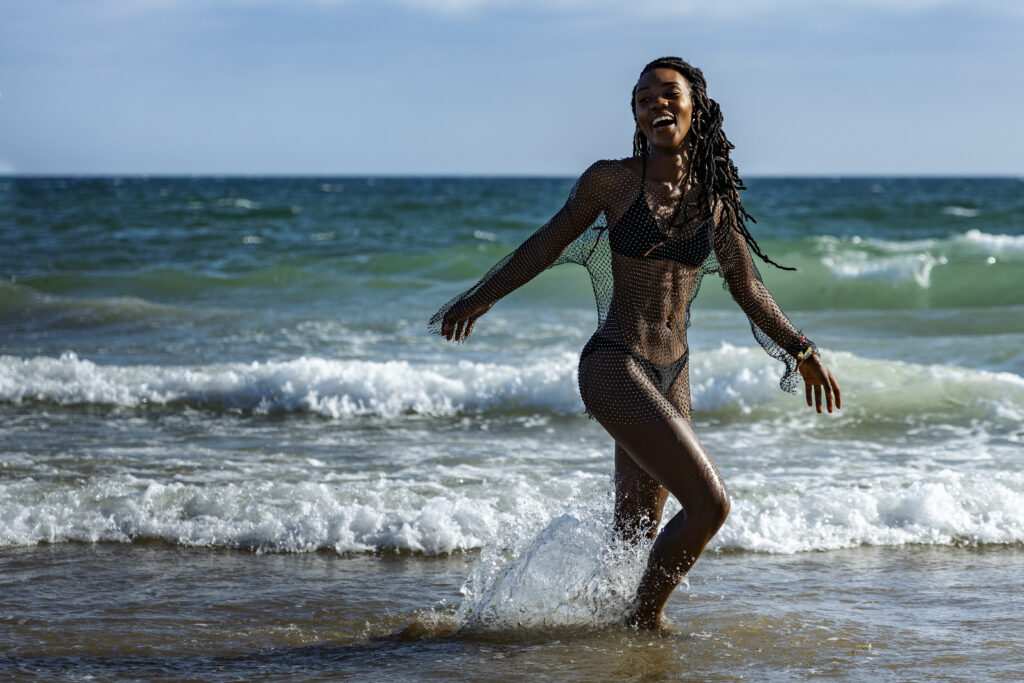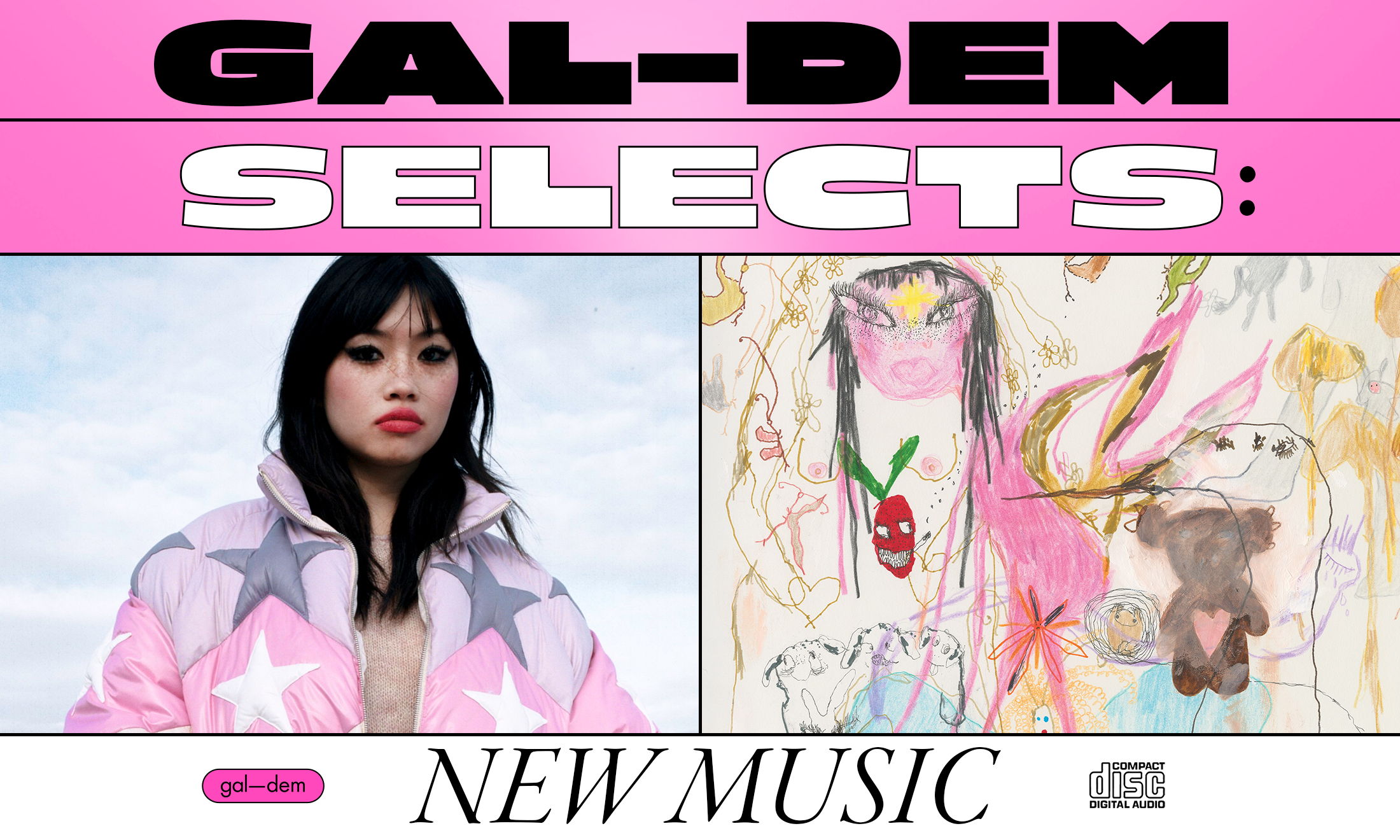Photos from Afro Nation illustrate the black British summer of release
The delayed festival’s debut in Portugal earlier this month showed the power and joy of black culture on a global stage.
Georgina Lawton
20 Jul 2022
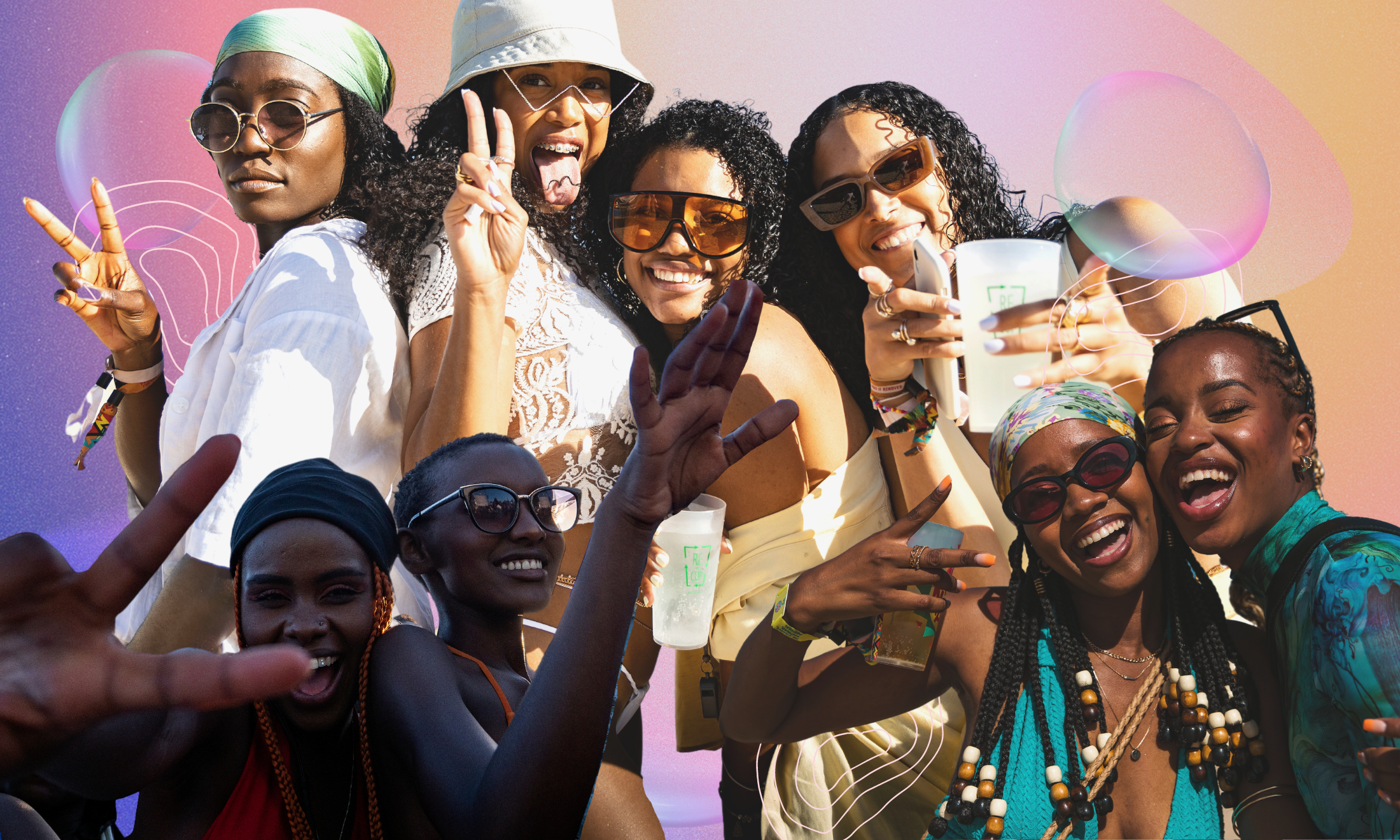
Afro Nation
As a brilliant orange sun melted into a blue horizon behind me and night began to fall, party-goers clad in colourful t-shirts, cream crochet two-pieces and tassel beach cover ups began moving from the back of the golden sands of Praia da Rocha toward the main stage for the headline act. With blonde goddess braids, tight coils and buoyant afros in tow, they let the music move through them as they shuffled forward in sync, two-stepping and twerking with drinks in hand, smiles broad. We’re outside.
Afro Nation Portugal finally went ahead after a Covid-related two-year hiatus, with 35,000 people descending on Praia da Rocha beach in Portugal’s Algarve for music and mayhem across one weekend in early July. Organisers had previously faced controversy for refusing to dish out refunds following prior cancellations and many unhappy customers had taken to Twitter to label the whole thing a scam. In fact every year is a battle for organisers to beat the Fyre Festival accusations.
Luckily this year’s offering proved that it was no such thing. That Afro Nation took place a stone’s throw from Lagos, in the Algarve, a port town to which Portugal’s first African slaves arrived in the 15th century (hence the shared name of the bustling Nigerian city) is symbolic. It’s proof that music and dance can offer some balm to ancestral trauma, replacing pain with communion and community. At a time where African music is thriving, and black British nightlife is filling dance floors not just domestically but also internationally (DLT Malta, DLT Ghana, Recess’s upcoming party in Paris) – there’s also a push to celebrate our culture, enjoy each other’s company after a tumultuous couple of years and get off this island in search of enjoyment.
Billed as the biggest afrobeats concert on earth, Afro Nation combined a relaxed beach atmosphere with dance, hip-hop, amapiano and afrobeats. Revellers filled up the nearby town of Portimao before the festival began, with the official show starting on Friday and music running from 5pm to 1am each day until Sunday. The sound issues that plagued the London 2021 festival, Yam Carnival (run by Afro Nation organisers) were nowhere to be seen this year. Afro Nation 2022 also saw the introduction of a Golden Circle pass which enabled audiences to stand a mere few inches away from the onstage acts. Although great for those who could afford it, the festival at times therefore felt slightly segregated, with normal ticket-holders being stationed far behind the Golden Circle bourgeois.
The Friday night boasted opening performances from Nigerian stars Davido and Rema, CKay and Omah Lay; the latter of whom have enjoyed meteoric rises to success since 2019 after social media and Tiktok helped them break into the mainstream. It was great to see the festival platforming artists such as these, but the lack of women performers and headliners was evident.
Unfortunately Chris Brown headed up the earlier Saturday evening slot, where he had just flown in from Wireless Festival, one of his first UK performances in 12 years following a ban after assaulting then-girlfriend Rihanna in 2009. One woman beside me turned her back for the entirety of his set, telling me she “just hated him”. Then, when his last song was still in full swing, she held up a screensaver on her phone which read: “Justice for Rihanna”.
The mood was lifted later that night when Wizkid emerged on stage, making a grand entrance to his 2019 track ‘Soco’. Paying both sides of the crowd equal attention and praising Burna Boy and Davido in between tracks, he ran through his repertoire performing ‘Ojuelegba’, from his 2017 album, Ayo, and his largest hit to date, ‘Essence’ from his 2020 Made In Lagos album. On ‘Essence’, he effortlessly hit chorus notes that belonged to singer Tems while standing on a speaker. Tems, an artist who I’d yearned to see for some time, announced that she would be unable to perform at Afro Nation six weeks before the show opened, citing schedule clashes. Luckily for audiences, there weren’t any more cancellations or no-shows across the weekend.
Wizkid later moved onto a track with Naira Marley, a special guest, before his 2019 banger, ‘Joro’. During ‘Joro’, Wizkid reminded us of his prowess as a dancer, swaying his hips to the guitar and drum beat as he repeated the song’s refrain to a gleeful crowd: “Joro, joro, joro,” a shortening of the Yoruba slang ‘joromi’ meaning ‘come, let’s enjoy’ – an apt summary of his hour-long show. Later he was spotted at the official Afro Nation afterparty dancing to South African DJ DBNGOGO’s eclectic and jam-packed amapiano set, surrounded by friends and fans, sunglasses still firmly fixed to his face above a permanent grin.
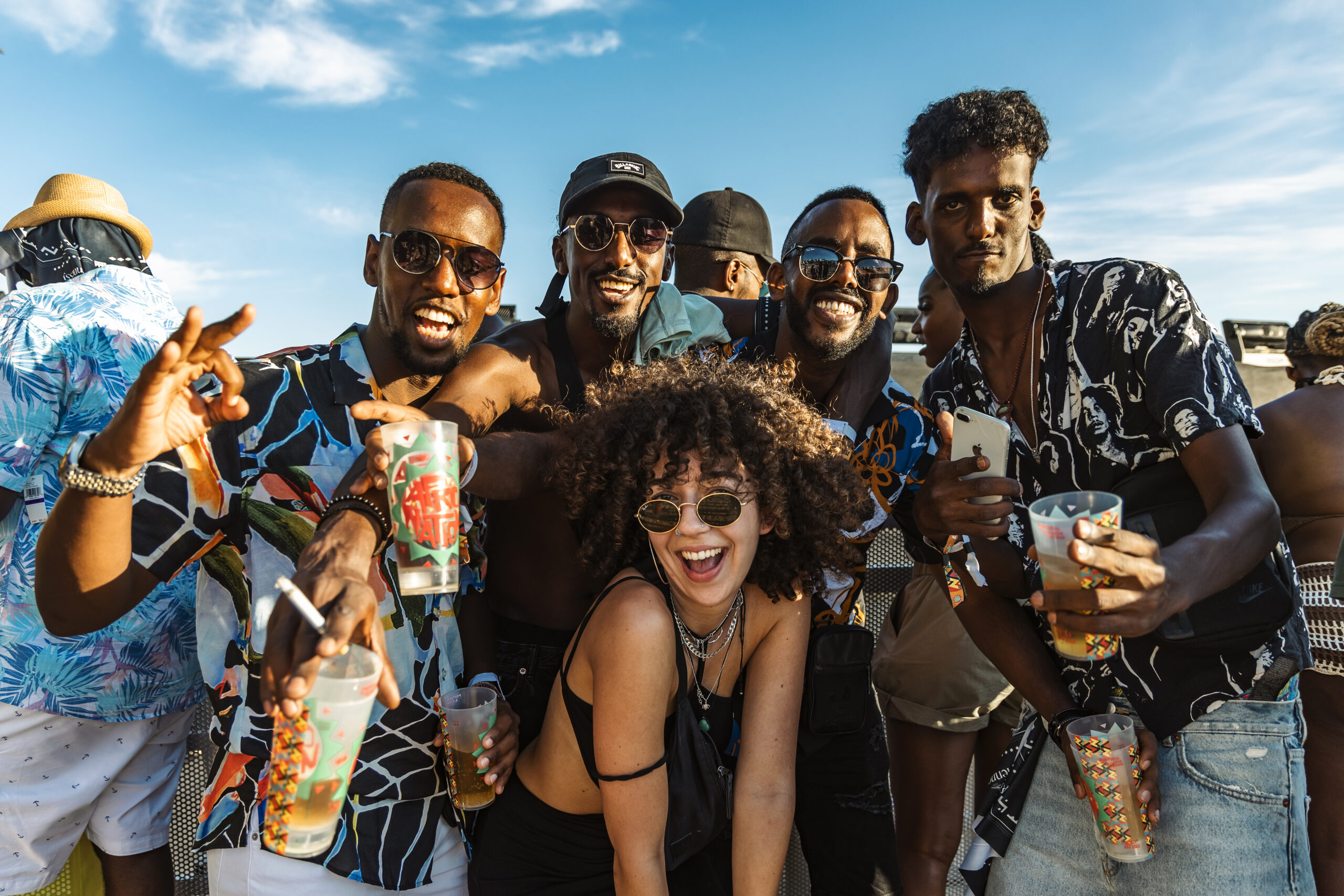
“Those that made it live to tell a salacious tale or three, those that didn’t promise they will get their coins ready for next year”
Delays on Friday and Saturday night (it would have been too much to expect the festival not to run on some element of BPT afterall) meant that some artists rolled over onto the Sunday. Megan Thee Stallion, who was always billed for the closing evening, skillfully worked the crowd, plucking a handful of men and women to join her onstage in a three-part twerk competition while telling the crowd she wanted to break the rules. In between the antics, her vocals delivered as she performed Tina Snow album classics such as ‘Big Ole Freak’, as well as bigger hits ‘Savage’ and ‘WAP’ alongside a troupe of dancers in matching bodysuits. Her latest single, ‘Plan B’, a 1990s-inspired, foot-stomping ode to birth control had the women hyped and the men quivering, and felt all the more timely following the shock overturning of Roe vs Wade in the US last month.
Burna Boy, who was originally scheduled for Friday, gave an energetic performance on the final evening, singing emphatically to hits like ‘Gbona’ with dancers and pillars of fire. A goosebump-inducing rendition of ‘Wonderful’ followed a disclosure to the crowd that it was his birthday and cheers erupted as his friends later doused him in champagne. Last Last’ electrified the crowd, but when Burna closed Afro Nation with ‘Ye’ with the audience hanging off every word, it was a triumphant moment for everyone present, a reminder of the epochal shift within the music industry and wider cultural framework, where music of West African origin now dominates the charts and can draw festival crowds of thousands – a feat that would have, perhaps, been unthinkable just five years ago.
Afro Nation broke new ground. The collective exhilaration of the crowd was omniscient, the performances on-point. It follows another successful black music event, DLT, which hosted its first event abroad in Malta, to resounding praise. The demand for events such as these is clear. Just look at the collective jubilation and (and envy) in the comment section of all the social media clips uploaded to the timeline when they are over. Those that made it live to tell a salacious tale or three, those that didn’t promise they will get their coins ready for next year.
Afro Nation curated a vibe so impeccable, it will last to sustain audiences until its next offering. Impromptu dance competitions took place on the beach, twerking was de rigueur, flirting was rife but not overbearing. There was a sense that everything should be enjoyed after such a long wait. The festival platformed artists often overlooked by a homogeneous festival circuit, but it also highlighted the adaptive, resourceful nature of the African diaspora and the circularity of shared black experiences around the world and for that, it made history.
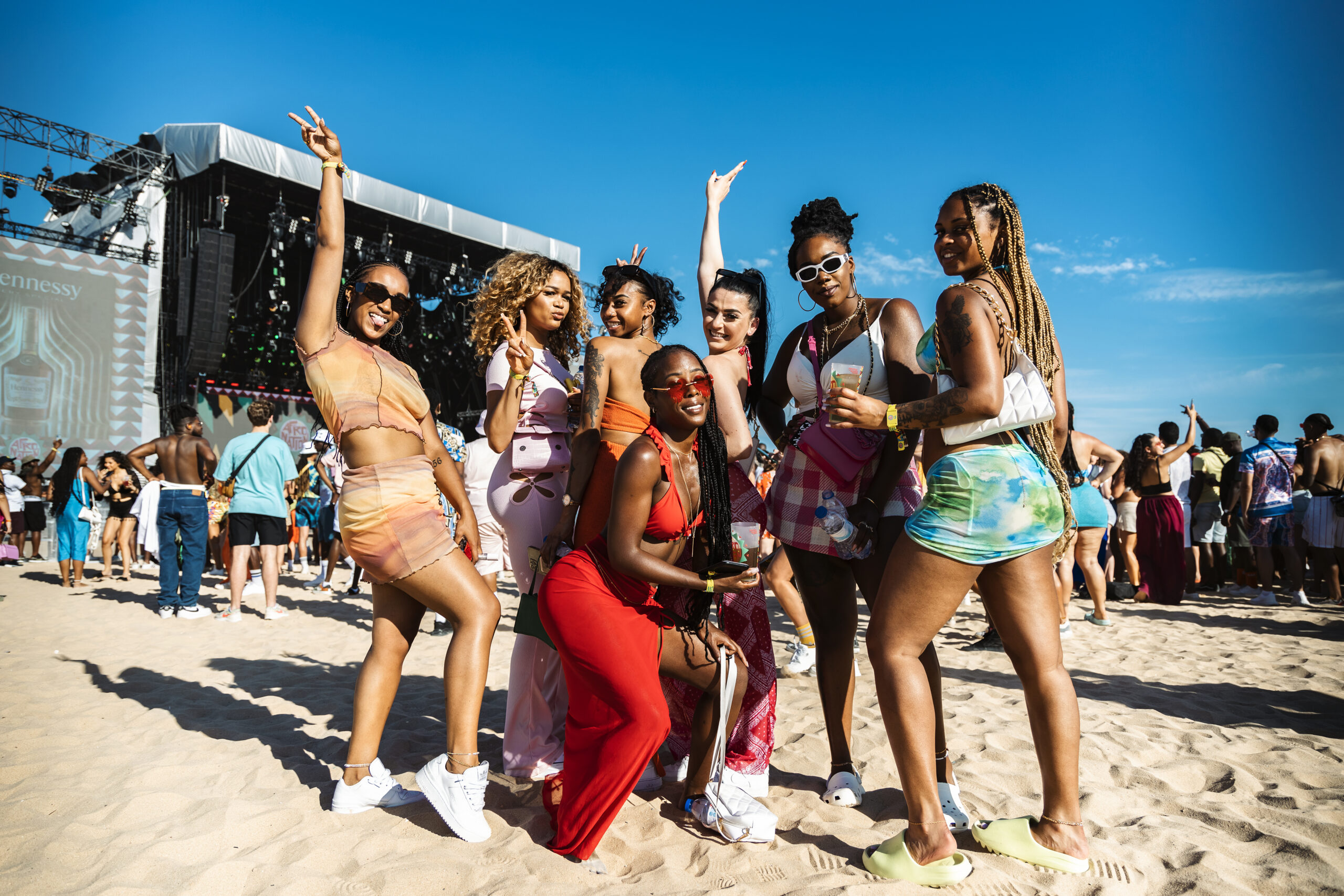
Our groundbreaking journalism relies on the crucial support of a community of gal-dem members. We would not be able to continue to hold truth to power in this industry without them, and you can support us from £5 per month – less than a weekly coffee.
Our members get exclusive access to events, discounts from independent brands, newsletters from our editors, quarterly gifts, print magazines, and so much more!

